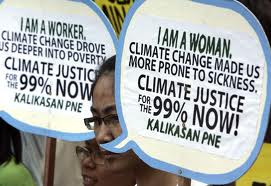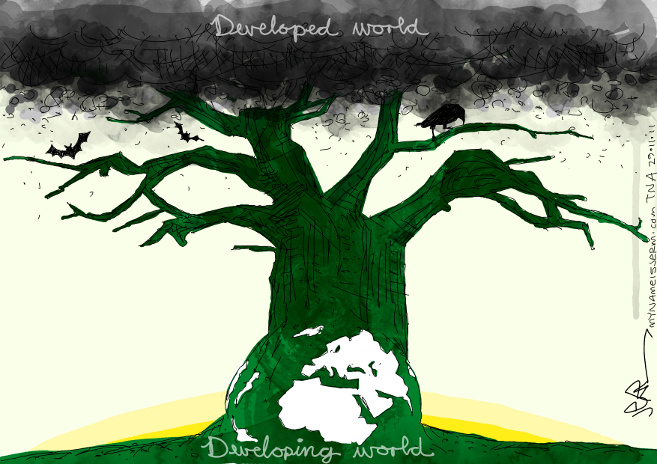“The only real solution to climate change is to leave the oil in the soil, coal in the hole and tar sands in the land.“
– Ivonne Yanez, Acción Ecologica, Ecuador
I had that dream again last night, or at least a familiar variant of it. It was not the running dream, but close enough. “Fight or Flight” reaction switched on in my brain chemistry. We were on active duty, in an office complex near the sea.
Some sort of surveillance mission was in progress. I was setting up a high-resolution camera on a tripod when I saw the outlines- three of them- of great gray ships. They were coming our way with due deliberation, growing in size as the minutes ticked by.
There were about fifteen minutes left before the alarm was going to sound- I knew that somehow in the dream but the belief system remained consistent.
The ships were not on the ocean, and not of it. They floated with grim majesty toward the complex where we stood, peering out the window. I guess there was some running after we realized they were coming for us. I tried to find an interior wall, as though the ships were some force of nature like a hurricane.
Looking up at a louvered glass window, I saw a vast moving shadow that blotted the light.
What the beings piloting the ships wanted would probably get clearer soon. They had arrived.
I can’t tell you what happened next, since a nice piece by Nikolai Rimsky-Korsakov, his Capriccio Espagnol, Opus 34, came on the radio. It is an orchestral work based on Spanish folk melodies written when the global temperature was about a degree cooler in centigrade than it is today. It is not his most famous work, but there is a quality to his symphonies that is quite evocative; old and new things mixed in a fiery cocktail of sound.
I felt the two worlds slowly begin to integrate in the darkness. I preferred to stay under the eiderdown, but the adrenaline from the dream was still sparking along my nerve ends.
“Screw it,” I thought. “It is Monday and there is no getting away from it.” I padded off to the kitchen and started the coffee and booted the computer. I streamed the Colorado station that carries the BBC in the middle of their night, and listened to what is important to Bush House in London.
The rich aroma of the Dazbog coffee filled the unit. I get a couple bags in the mail each month, but I imagine that is irresponsible. I will have to start looking for coffee grown and roasted locally, I imagine, once everything starts to change.
The COP-17 Climate Summit at Durban was very much on the mind of one BBC commentator, though it seemed to fall somewhere behind the news about UK’s position on the Eurozone consolidation and the demonstrations against Mr. Putin in Russia.
I frowned. I certainly understand Britain’s discomfiture on the whole European thing. It might tear apart the coalition government of Mr. Cameron. But that is not my problem this morning. I was intensely curious about what had happened in Durban at the COP-17 Indaba.
It used to be the most famous export from Durban was a particularly potent strain of marijuana. No more.
The Durban negotiations lasted an extra day and night past the official close on Friday. Apparently governments from 194 countries have agreed to extend the Kyoto Protocol to reduce carbon emissions. They also established a more ambitious global framework for reducing emissions, and opened the Green Climate Fund to give cash to someone in the UN who promises to assist developing countries’ efforts to address climate change.
That much was clear from the Beeb, but I wanted more.
I looked in the New York Times e-edition to get the latest. It was very curious. There was nothing there. “Maybe it didn’t make the abridged version,” I thought, and Googled all articles in the paper for the last thirty days. The last story of any length was dated before the Conference started.
No help. The questions before the conference had little to do with the science. Instead, it was mostly about The Process, and the distribution of reparations from the First World to the Third.
It was better put by a querulous comment on one of the news articles on the Indaba: “The UN plan will shift wealth from the first world’s poor to the third world’s rich without making any difference in climate.”
Well, that is one way to look at it, I suppose, since the smart guys in the First World will ensure that the poorest actually cough up the money, and the sharks in the Third World will appropriate it all in bribes and kick-backs.
That seems kind of stupid. The Conferees had been concerned with some previously unknown consequences of climate change. There was a prominent paper that linked the First World to a sort of Climatic Apartheid. There was another that pointed out that women were likely to be impacted by climate change more than men. I scratched my head on that one. There was all sorts of extraordinary stuff.
The real answer, of course, revolved around money, and the process by which it will be provided to the developing world.
I found something from Kumi Naidoo, Greenpeace International’s Executive Director, who gave a bleak assessment of what emerged at the end of the conference before he climbed on a jet for another continent. Mr. Maidoo is a long-term anti-apartheid activist and Rhodes Scholar. His degree is in Political Psychology, which natural provides him special insight into The Process, if not the science.
His post said: “…our Governments this past two weeks listened to the carbon-intensive polluting corporations instead of listening to the people who want an end to our dependence on fossil fuels and real and immediate action on climate change.”
“The grim news is that the blockers led by the US have succeeded in inserting a vital get-out clause that could easily prevent the next big climate deal being legally binding. If that loophole is exploited it could be a disaster….leaving almost no room for increasing the depth of carbon cuts in this decade when scientists say we need emissions to peak.”
An organization called “Climate Justice Now!” was more direct in their assessment, accusing the First World (where they live) of crimes against humanity. “Delaying real action until 2020 is a crime of global proportions,” says their website.
One of their heavy-lifters is a woman named Janet Redman. She is Co-director of the Sustainable Energy & Economy Network at the Institute for Policy Studies, a progressive think tank.
She said in her blog that “Industrialized northern countries are morally and legally obligated to repay their climate debt.”
I checked out her credentials. She is an expert, holding a Masters degree in international development from quirky Clark University in Worcester, MA. She has a bachelor’s degree, too.
She says “Developed countries grew rich at the expense of the planet and the future all people by exploiting cheap coal and oil. They must pay for the resulting loss and damages, dramatically reduce emissions now, and financially support developing countries to shift to clean energy pathways.”
I tried to find out what she thought about things this morning, now that Durban is done, and whether she agreed with Greenpeace. There was nothing posted since last Friday.
Apparently the thousands of delegates are all hurtling at Flight Level 36 spewing carbon dioxide on their way home to get ready to go to the big conference in Qatar next year.
I wish them all the best. I mean, with the big crisis that is just around the corner, we need to have social justice, gender equality, eliminate patent and intellectual property rights and end the World Bank’s domination of the climate to make things better.
Oh, and all that money. Quickly.
I can’t wait to see what comes next. Maybe the Times will get around to covering the whole thing this week. I wonder what really happened.

Copyright 2011 Vic Socotra
www.vicsocotra .com

